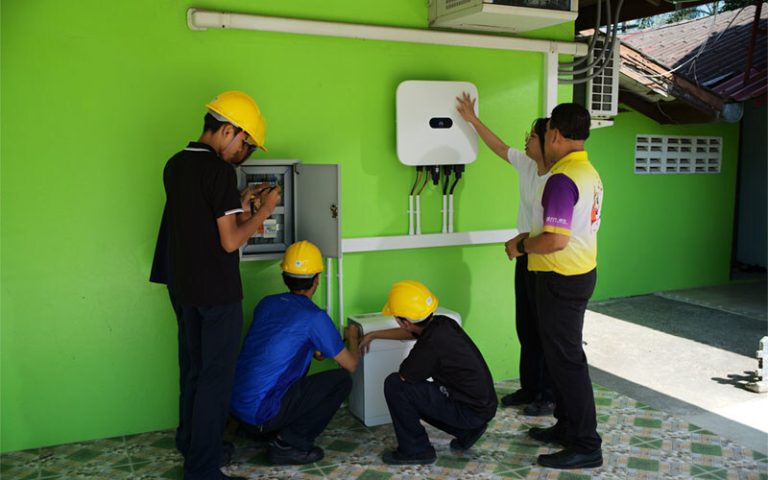A New Era of Green Education in Thailand
In a significant move towards a sustainable future, Huawei, JA Solar, UNESCO, and Thailand’s Ministry of Education have launched the Green Education Project in Thailand. This initiative aims to empower a new generation of students with green skills and digital literacy, equipping them to thrive in the growing renewable energy sector.
Driving Change Through Green Education
The Green Education Project is part of Huawei’s TECH4ALL initiative and will provide solar energy solutions and training in Information and Communications Technology (ICT) to 11 schools and community hubs across Thailand. This project marks a critical step in bridging the education and energy gaps in rural and underserved areas of the country.
Project Launch and Inaugural Beneficiaries
The official launch took place on December 3, 2024, in Nakhon Nayok, where a solar-powered rooftop system was installed at Banna District Learning Encouragement Center, one of the first beneficiaries of the program. The newly installed system will power the school and offer students practical experience in installing and maintaining renewable energy systems.
Empowering Youth for a Sustainable Future
David Li, CEO of Huawei Thailand, emphasized the long-term impact of the project: “The Green Education Project is much more than a corporate social responsibility initiative—it is a long-term investment in Thailand’s youth. By combining green energy solutions with educational opportunities, we aim to create a model for sustainable growth and inclusion.”
The project seeks to equip young people with the skills they need to succeed in a rapidly evolving digital and green economy. By providing training in renewable energy systems and ICT, students will gain valuable experience that will open doors to future employment opportunities in the growing green energy sector.
Tackling Education and Energy Challenges
Thailand faces significant challenges in providing quality education and sustainable energy solutions, particularly in rural areas. Through this initiative, Huawei, UNESCO, and Thailand’s Ministry of Education aim to address these challenges head-on by installing renewable energy systems in schools and offering digital training that will help students become leaders in green innovation.
The first two beneficiaries of the project—Banna District Learning Encouragement Center and Kanchanapisek Vocational Training College—are already benefitting from solar energy systems and digital literacy training. The Banna Center will provide free green energy and digital literacy courses to the local community, while Kanchanapisek will focus on hands-on training in photovoltaic (solar power) system installation, maintenance, and operation.
Hands-On Experience for Future Careers
Tisakorn Klinbooppha, Director of Banna District Learning Encouragement Center, remarked: “This project is a fantastic example of how collaboration between global organizations and local schools can bring about real change. The students will gain valuable skills that will not only make them more competitive in the job market but also contribute to the growing green economy.”
By integrating renewable energy systems into the curriculum, the project ensures that students gain practical, hands-on experience with cutting-edge technologies, preparing them for careers in the renewable energy sector.
Three Pillars of the Green Education Project
The Green Education Project is structured around three key pillars that will drive its long-term impact:
- Green Schools for Secondary Education: Solar systems will be installed in secondary schools, and both students and teachers will be trained in renewable energy practices and their operation.
- Green Schools for Vocational Education: Vocational training colleges will equip students with the skills needed to install and maintain photovoltaic systems, preparing them for careers in the expanding green energy industry.
- Green Communities: Public libraries and community centers will benefit from renewable energy solutions and mobile digital education programs, focusing on training in green energy and cybersecurity through Huawei’s Digital Bus.
Expanding the Reach of Green Education
Huawei’s Digital Bus, which has already toured 10 remote provinces, offers training in green energy, cybercrime awareness, and telecommunications. The project aims to expand its reach, with plans to visit more regions, providing training for thousands of students across the country.
Looking Ahead: A Sustainable Future for Thailand
Thailand’s national agenda for renewable energy aligns with this initiative, providing a blueprint for other nations to follow. As Huawei, JA Solar, and UNESCO continue to expand the project, they hope to create a future where every student in Thailand has access to sustainable education and the skills required to thrive in the digital and green economy.
The Green Education Project not only empowers Thailand’s youth with essential skills but also plays a vital role in building a more sustainable future for the country and the world.


